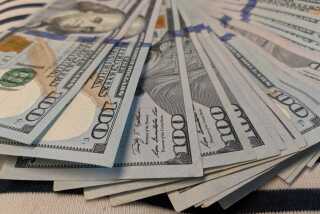Euro Bests Yen, Dollar as U.S. Outlook Dims
- Share via
The dollar suddenly is taking a thrashing at the hands of a resurgent euro currency--a trend that, if it continues, could hamper potential U.S. interest rate cuts.
The euro’s value rose Tuesday to 93 U.S. cents in New York, its highest level since July and a 10% gain since mid-November, as traders dumped dollars and bought euros.
Meanwhile, the euro also is rising against the Japanese yen.
The abrupt shift in currency values is rooted in the increasingly worrisome outlooks for the U.S. and Japanese economies.
A currency’s value generally reflects global investors’ views of the strength of the economy behind the currency. If foreigners want to invest in a particular economy--say, in its stocks--they must buy the native currency to do so, thus bolstering its value.
Likewise, if foreign investors take money out of an economy, that can put downward pressure on the nation’s currency as it is sold for other currencies.
The dollar’s sudden weakness against the euro reflects European investors’ dimming view of the U.S. economy, amid a barrage of data showing that growth has slowed, analysts say. Although the 11-nation euro bloc economy also is expected to slow, currency traders’ sentiment in recent weeks has tilted toward the idea that Europe could be the best place to withstand a global slowdown. That has lifted the euro from a record low of about 83 cents on Oct. 25.
Many U.S. companies might welcome a slumping dollar because it would make U.S. exports cheaper for European buyers.
But a sinking dollar also could make European exports more expensive in the United States, boosting inflation. With the U.S. still running a record trade deficit, such imported inflation could cause the Federal Reserve to reconsider sharp interest rate cuts to help the U.S. economy, analysts say.
Lower U.S. rates could make dollar-denominated bonds less attractive, deepening any dollar slide.
Though the dollar has weakened, the yen is in worse shape: It hit a 10-month low versus the euro on Tuesday, and a 16-month low against the dollar, at 113.63 yen per dollar in New York.
Japan’s economic situation is considered much more dire than what the U.S. or Europe faces.
The Japanese government said Tuesday that unemployment rose to a near-record 4.8% in November. The rate edged up 0.1 point from October, approaching the post-World War II high of 4.9% registered in February.
The November employment data were slightly worse than analysts had expected and joined a series of economic indicators released Tuesday that cast doubts on efforts by Japan’s conservative coalition government to nurse the world’s second-biggest economy back to health.
Consumer spending, retail sales and prices were all down in November from the same month a year earlier, the government said.
“Most of the data look quite bad for private consumption,” said Masaaki Kanno, economist at J.P. Morgan Securities Asia Inc.
In currency markets, the surprise has been that traders haven’t turned exclusively to the dollar as they dump yen. The euro’s gains, at a time of year when the dollar often is strong, have raised the possibility that the euro could continue a sharp rebound in 2001. “Traditionally, there’s always a chase after the dollar toward the end of the year . . . but not this time,” said John Schein, vice president at Fortis, USA in New York.
Of course, the dollar has been strong for so long that a short-term sell-off hardly constitutes a disaster, experts say. The key will be what happens early in 2001 and whether any dollar sell-off accelerates.
(BEGIN TEXT OF INFOBOX / INFOGRAPHIC)
Euro Rebound
The euro currency’s value has resurged against the dollar in recent weeks, though the euro has a long climb just to reach its value when it was created Dec. 31, 1998.
*
Euro’s value in U.S. dollars, monthly figures and latest
Dec. 31, 1998: $1.17
Tuesday: 93 cents
Source: Bloomberg News
More to Read
Inside the business of entertainment
The Wide Shot brings you news, analysis and insights on everything from streaming wars to production — and what it all means for the future.
You may occasionally receive promotional content from the Los Angeles Times.









